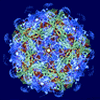 |
||||||||||
Updated: December 29, 2026
Infections: Who Is Most at Risk?
Prognostic Indicators Can Identify Infection Risk
Know Your Enemy
 Serious infections account for an alarming proportion of deaths among CLL patients.
But are some patients more at risk than others? What are the prognostic indicators
which can help you assess the risk of serious infections in your own case? In
Who Is Most at Risk?
we review a very recent article that looks at the different risk buckets and provides
some practical pointers to improve your chances of staying out of the hospital.
Serious infections account for an alarming proportion of deaths among CLL patients.
But are some patients more at risk than others? What are the prognostic indicators
which can help you assess the risk of serious infections in your own case? In
Who Is Most at Risk?
we review a very recent article that looks at the different risk buckets and provides
some practical pointers to improve your chances of staying out of the hospital.
Super Bugs: Staph
MRSA Is on the Loose — Avoidance is Critical
The Dangers of Drug Resistant Bacterial Infections
 Recent reports prove that infections from strains of drug-resistant bacteria are far more prevalent than
previously thought, accounting for more than half of all skin infections treated in hospital emergency rooms.
Infectious diseases experts are trying hard to get the word out. While this poses a serious threat to public
health, CLL patients will do well to pay special attention to this phenomenon and take some precautions —
so that they may avoid these difficult and persistent infections which their systems are
ill-equipped to fight. Read about these super bugs in
The Dangers of Drug Resistant Bacterial Infections.
Recent reports prove that infections from strains of drug-resistant bacteria are far more prevalent than
previously thought, accounting for more than half of all skin infections treated in hospital emergency rooms.
Infectious diseases experts are trying hard to get the word out. While this poses a serious threat to public
health, CLL patients will do well to pay special attention to this phenomenon and take some precautions —
so that they may avoid these difficult and persistent infections which their systems are
ill-equipped to fight. Read about these super bugs in
The Dangers of Drug Resistant Bacterial Infections.
EBV
The Kiss that Can Kill
The Enemy Within
 The Epstein-Barr Virus (EBV) has long been known as a complicating factor in many cancers. Recent research has shown just how serious is the threat posed by this virus in CLL. EBV is estimated to be present in over 90% of adults in the western world but is normally kept in dormancy by active T-cells. Read The Enemy Within to learn how EBV can interfere with normal T-cell function and how T-cell damaging therapy with agents such as fludarabine and Campath can unleash EBV with life-threatening consequences. We also discuss how patients may be able to use a common statin to improve their defenses against this virus.
The Epstein-Barr Virus (EBV) has long been known as a complicating factor in many cancers. Recent research has shown just how serious is the threat posed by this virus in CLL. EBV is estimated to be present in over 90% of adults in the western world but is normally kept in dormancy by active T-cells. Read The Enemy Within to learn how EBV can interfere with normal T-cell function and how T-cell damaging therapy with agents such as fludarabine and Campath can unleash EBV with life-threatening consequences. We also discuss how patients may be able to use a common statin to improve their defenses against this virus.
Infectious Complications
Best Practices
How to Treat and Manage Infections in CLL
 Infectious complications are the major cause of mortality in CLL and affect the quality of life of most patients. The best practices in managing infections have changed over time, tracking our knowledge of the molecular mechanisms at work and reflecting the nature of the therapies used to treat the CLL itself. In our article Infectious Complications of CLL, we review the latest expert findings. We also highlight the need for patients to be actively involved in discussing these best practices with their local oncologists, to ensure that they receive appropriate care.
Infectious complications are the major cause of mortality in CLL and affect the quality of life of most patients. The best practices in managing infections have changed over time, tracking our knowledge of the molecular mechanisms at work and reflecting the nature of the therapies used to treat the CLL itself. In our article Infectious Complications of CLL, we review the latest expert findings. We also highlight the need for patients to be actively involved in discussing these best practices with their local oncologists, to ensure that they receive appropriate care.
Editorial: Standards for Best Practices
The Rate of Information Trickle-down
How Much Do Local Oncologists Know about CLL?
 This article, Standards for Best Practices, is mainly analysis, commentary and editorial. We examine how the key process of continuing medical education takes place
in the U.S. health care system. While the experts at the major cancer centers are making their
breakthroughs, local oncologists are handicapped by a variety of factors that can result in
sub-par heathcare delivery. To close the gap, we advocate the publication of authoritative best
practice guidelines by our CLL experts — and greater patient participation in the trickle down
of information to the local oncology practices.
This article, Standards for Best Practices, is mainly analysis, commentary and editorial. We examine how the key process of continuing medical education takes place
in the U.S. health care system. While the experts at the major cancer centers are making their
breakthroughs, local oncologists are handicapped by a variety of factors that can result in
sub-par heathcare delivery. To close the gap, we advocate the publication of authoritative best
practice guidelines by our CLL experts — and greater patient participation in the trickle down
of information to the local oncology practices.
Flu Preparedness
Pneumonia Is the Single Biggest Killer of CLL Patients
Some Pointers to Resources and Education
 The annual influenza season will soon be upon us. In
Flu Preparedness we offer
some research findings and practical advice on making it through
this season, whether we are faced with the common or garden
variety of flu - or a more ominous humanized version of the
avian flu.
The annual influenza season will soon be upon us. In
Flu Preparedness we offer
some research findings and practical advice on making it through
this season, whether we are faced with the common or garden
variety of flu - or a more ominous humanized version of the
avian flu.
Mayo Best Practices
Current Approach to Diagnosis and Management of CLL
What You and Your Oncologist Need to Know about CLL
 We review and comment on an important new paper from the
Mayo Clinic Hematology Team. Authors Shanafelt and Call
provide an extremely useful review of recent changes in
diagnostic methods and risk assessment and their therapeutic
implications for various cytogenetic sub-categories of CLL.
This is a must-read paper for both you and your local oncologist.
Our editorial comment examines areas in which they could have
gone farther in their recommendations. Click here to read
Need to Know.
We review and comment on an important new paper from the
Mayo Clinic Hematology Team. Authors Shanafelt and Call
provide an extremely useful review of recent changes in
diagnostic methods and risk assessment and their therapeutic
implications for various cytogenetic sub-categories of CLL.
This is a must-read paper for both you and your local oncologist.
Our editorial comment examines areas in which they could have
gone farther in their recommendations. Click here to read
Need to Know.
Dying to Get a Tan?
The Danger of Squamous Cell Carcinoma in CLL Patients
Things You Can Do to Avoid SCC
 If you have CLL, you have a much higher chance of getting squamous cell carcinoma (SCC), the second most common skin cancer. Further, CLL patients who contract this disease are more likely to have an aggressive form of the disease. We examine some of the possible mechanisms for the onset of this cancer and review a number of steps you can take to protect yourself including a few things you can discuss with your doctor that may help. Click here to read Dying to Get a Tan?
If you have CLL, you have a much higher chance of getting squamous cell carcinoma (SCC), the second most common skin cancer. Further, CLL patients who contract this disease are more likely to have an aggressive form of the disease. We examine some of the possible mechanisms for the onset of this cancer and review a number of steps you can take to protect yourself including a few things you can discuss with your doctor that may help. Click here to read Dying to Get a Tan?
Chronic Pulmonary Inflammation
Major New Study Indicts Role of Pulmonary Inflammation
Deadly Feedback Cycle of Inflammation and CLL
 Widespread anecdotal evidence suggesting pulmonary complications are a major factor in CLL
is now supplanted by solid statistical data reported in an article in the November issue of
the journal Cancer by a team led by Dr. Kanti Rai at the Long Island Jewish Medical Center.
They confirm that pneumonia is by far the leading cause of mortality and morbidity for CLL
patients, and the leading pulmonary complication among patients hospitalized with CLL. Our article,
Role of Pulmonary Inflammation in CLL, examines the relationships involved and implications
for therapy.
Widespread anecdotal evidence suggesting pulmonary complications are a major factor in CLL
is now supplanted by solid statistical data reported in an article in the November issue of
the journal Cancer by a team led by Dr. Kanti Rai at the Long Island Jewish Medical Center.
They confirm that pneumonia is by far the leading cause of mortality and morbidity for CLL
patients, and the leading pulmonary complication among patients hospitalized with CLL. Our article,
Role of Pulmonary Inflammation in CLL, examines the relationships involved and implications
for therapy.
Prognosis at Diagnosis
Using Modern Tools
Integrating Molecular Biologic Insights into Clinical Practice
 We examine a critically important new Blood First Edition Paper -
pre-published online on October 23. Read
Prognosis at Diagnosis, our review of the article
from the experts at Mayo Clinic. While much of the research quoted
in this article has been previously reported, this article will
nevertheless be important. In Chaya's opinion, "What makes this
paper unique is that it puts it all together in one irrefutable
package: the research, the results, the logic, the recommendations.
I have no doubt this paper will be one of the most influential papers
in CLL, and will be influencing clinical practice for many years to come."
We examine a critically important new Blood First Edition Paper -
pre-published online on October 23. Read
Prognosis at Diagnosis, our review of the article
from the experts at Mayo Clinic. While much of the research quoted
in this article has been previously reported, this article will
nevertheless be important. In Chaya's opinion, "What makes this
paper unique is that it puts it all together in one irrefutable
package: the research, the results, the logic, the recommendations.
I have no doubt this paper will be one of the most influential papers
in CLL, and will be influencing clinical practice for many years to come."
 Enter Keywords: |
———
Disclaimer: The content of this website is intended for information only and is NOT meant to be medical advice. Please be sure to consult and follow the advice of your doctors on all medical matters.
Copyright Notice:
Copyright © 2026-2007 CLL Topics, Inc. All Rights Reserved.
All materials contained on this site are protected by United States copyright law and may not be reproduced, distributed, transmitted, displayed, published or broadcast without the prior written permission of CLL Topics, Inc. You may not alter or remove any trademark, copyright or other notice from copies of the content.
However, you may download and print material from CLLTopics.org exclusively for your personal, noncommercial use.
———
